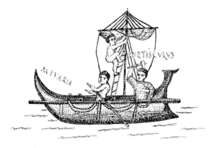LabLynx Wiki
Contents

An actuaria (plural: actuariae; a short form of navis actuaria, "ship that moves") was a type of merchant galley used primarily for trade and transport throughout the Roman Empire. In Greek, they were also known by the term akatos (ἄκατος; plural: akatoi). The actuaria was equipped with sails as well as oars. It was more expensive to operate than merchant sailing ships, and was used where speed and reliability were prioritized. It could carry both passengers and wares such as honey, cheese, meat, and even live animals intended for gladiator combat.[1]
Variants of the actuaria were used as troop transports, for example in the invasion of Britain. In 47 BC, Publius Vatinius equipped actuariae at Brindisi with temporary rams to support Julius Caesar's forces in Illyricum, on the other side of the Adriatic, though these were only suitable to combat smaller enemy vessels.[1] Actuariae were also employed along the major rivers by Germanicus in his campaigns against the Germanic tribes around 16 AD.[2]
A warship derivative of the actuaria known as a qit'a was possibly used by Arab fleets as late as the 8th century.[3]
See also
References
Bibliography
- Morrison, John S. & Gardiner, Robert (editors), The Age of the Galley: Mediterranean Oared Vessels Since Pre-Classical Times. Conway Maritime, London, 1995
- Viereck, Hans D. L., Die römische Flotte: Classis Romana. Koehler, Herford, 1975. ISBN 378220106X.
Further reading
- Emil Luebeck: "Actuariae". In: Realencyclopädie der classischen Altertumswissenschaft (RE). Volume I, 1, Stuttgart 1893, p. 331.
- Chatterton, Edward Keble (2010) [1909:Sidgwick & Jackson]. The history of sailing ships the story of their development from the earliest times until the 19th century. Historische Schiffahrt, 150. Bremen: Salzwasser. p. 107. ISBN 9783861953081. OCLC 845685916.
- Günther, Sven; Ruffing, Kai; Stoll, Oliver (2007). Pragmata: Beiträge zur Wirtschaftsgeschichte der Antike im Gedenken an Harald Winkel [Pragmata: Contributions to the Economic History of Antiquity in Memory of Harald Winkel]. Philippika, 17 (in German). Wiesbaden: Harrassowitz. ISBN 9783447055369. OCLC 153885180.

















